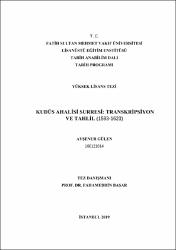| dc.contributor.advisor | Başar, Fahameddin | |
| dc.contributor.author | Gülen, Ayşenur | |
| dc.date.accessioned | 2020-02-04T13:21:53Z | |
| dc.date.available | 2020-02-04T13:21:53Z | |
| dc.date.issued | 2019 | en_US |
| dc.identifier.citation | GÜLEN, Ayşenur, Kudüs Ahalisi Surresi: Transkripsiyon ve Tahlil (1593-1623), Fatih Sultan Mehmet Vakıf Üniversitesi Lisansüstü Eğitim Enstitüsü Tarih Anabilim Dalı, Yayımlanmamış Yüksek Lisans Tezi, 2019. | en_US |
| dc.identifier.uri | https://hdl.handle.net/11352/3012 | |
| dc.description.abstract | Kudüs, üç semavi din tarafından kutsal kabul edilen mabetlere sahip önemli bir şehirdir. Bu sebeple, tarihte Kudüs’e hâkim olma çabası, birçok çekişmeye sahne olmuş, günümüzde de halen bölgedeki hakimiyet mücadelesi devam etmektedir. Osmanlı Devleti için de aynı şekilde kutsal sayılan bu şehir, sadece Yavuz Sultan Selim’in Mısır seferi sonrasında değil, kendisinden önceki padişahlar tarafından da ilgi görmüştür. Kutsal topraklara hizmet ederek hem sevaba nail olmak, hem de bu bölgelerin kontrolünü elde tutmak gayesi büyük önem taşımıştır.
Surre, Abbasiler (750-1258) zamanında başlayıp, Osmanlı Devleti zamanında (1299-1922) gelenek haline gelen, Mekke, Medine ve Kudüs’e gönderilen para ve hediyeleri tanımlayan bir terimdir. Osmanlı Devleti Kudüs’ü hakimiyeti altına aldıktan sonra düzenli olarak surre göndermiştir. Surre, sadece yardım amaçlı olmayıp, bir nevî bölge üzerinde hakimiyet gücünü göstermenin sembolü haline gelmiştir.
Bu tezde; Hicri 1002, 1012, 1030 ve 1032 tarihli surre defterleri transkript edilerek, elde edilen bilgiler ile dönemin Kudüs halkı ve ileri gelen ailelerinin sosyo-ekonomik durum tahlil edilmeye çalışılmıştır. | en_US |
| dc.description.abstract | Jerusalem which has temples enshrined by three divine religions is a significant city. This is why, on the course of history, the struggle to rule over Jerusalem has caused many conflicts and even today the fight for dominance goes on. This city, which is accepted to be just as holy for Ottoman Empire as it is for others, has seen interest not only after Egypt campaign of Yavuz Sultan Selim, but also from other sultans before him. They intended both to acquire merit by serving the holy lands and to set dominance over these areas.
Surre is the given name of money and presents that are sent to Mecca, Medina and Jerusalem; which started at the time of the Abbasids (750-1258) and turned into a tradition at the time of Ottoman Empire (1299-1922). Ottoman Empire has sent Surre routinely after conquering Jerusalem. Surre has not only been intended for help, but also become some sort of symbol to show the power of dominance over the area.
In this thesis, the information that is acquired from transcripting Surre records of years 1002, 1012, 1030 and 1032 of the Hegira calendar was used to reflect Jerusalem people of the time, topliners and noble families and the socioeconomic status was attempted to be analyzed. | en_US |
| dc.language.iso | tur | en_US |
| dc.publisher | Fatih Sultan Mehmet Vakıf Üniversitesi, Lisansüstü Eğitim Enstitüsü | en_US |
| dc.rights | info:eu-repo/semantics/openAccess | en_US |
| dc.subject | Surre | en_US |
| dc.subject | Kudüs | en_US |
| dc.subject | Osmanlı Devleti | en_US |
| dc.subject | Vakıflar | en_US |
| dc.subject | Surre | en_US |
| dc.subject | Jerusalem | en_US |
| dc.subject | Ottoman Empire | en_US |
| dc.subject | Foundations | en_US |
| dc.title | Kudüs Ahalisi Surresi: Transkripsiyon ve Tahlil (1593-1623) | en_US |
| dc.title.alternative | Surre of Jerusalem Community: Transcripton and Analysis (1593-1623) | en_US |
| dc.type | masterThesis | en_US |
| dc.contributor.department | FSM Vakıf Üniversitesi, Lisansüstü Eğitim Enstitüsü | en_US |
| dc.relation.publicationcategory | Tez | en_US |
| dc.contributor.institutionauthor | | |
| dc.contributor.institutionauthor | Gülen, Ayşenur | |



















